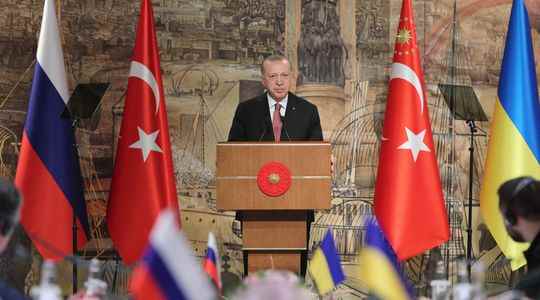Only one image counted for Ankara. This Tuesday, the Ottoman gilding of the Dolmabahçe Palace in Istanbul hosted essential negotiations, at least on a symbolic level, between Ukraine and Russia. Never mind that the only Russian concession is the announcement – subject to caution – of a reduction in its military activity in the direction of kyiv. Never mind that the spokesman for the Russian presidency, Dmitry Peskov, said the next day that the meeting had produced nothing “very promising”. For Turkey, the essential is acquired and held in one sequence: the Russian and Ukrainian delegates, standing, applauding Recep Tayyip Erdogan at the end of his opening speech.
Erdogan’s subtle “at the same time”
The Turkish president has imposed himself as a central mediator in this conflict, managing to steal this role from the other candidates, whether Israel, France or Germany. A success that it owes to the “policy of balance” skilfully preserved by the king. “On the one hand he is closing access to the Bosphorus Strait to the Russian fleet, but on the other hand he is refusing to follow in the footsteps of international sanctions against Moscow, explains Turkish political scientist Ilhan Üzgel. On the one hand he is voting a text condemning the Russian invasion at the UN, but on the other comes out against its expulsion from the Council of Europe.”
Vladimir Putin is also sensitive to the fact that Turkey is perceived as a troublemaker within NATO. “The mere fact that a country that is part of NATO displays a policy of balance vis-à-vis Russia is already a satisfaction for Putin”, explains the academic.
Very dependent on the Ukrainian defense industry, in particular for the design of the engines of its new generation of armed drones and for its unmanned aircraft projects, but also very close to Moscow, particularly in the energy sector, Erdogan hopes to see this conflict end very soon. To the point of being tempted to replace the belligerents, as when he announced on March 25 that Ukraine agreed to meet Russian demands on four fundamental points, including the refusal to join NATO and the adoption of Russian as the sole official language. A statement very firmly denied by the Ukrainian Ministry of Foreign Affairs, which takes the opportunity to discreetly underline its desire to see Turkey join the train of Western sanctions against Moscow and participate more actively in arming kyiv.
With the West, a regained status
The important role played by Ankara in the negotiations also strengthens its position vis-à-vis its Western partners. On March 24, on the sidelines of the extraordinary NATO summit, Erdogan thus found himself face to face with Emmanuel Macron, who had nevertheless expressed serious doubts about the presence of Turkey within the transatlantic organization. And the two presidents declare that they want to work together, in concert with Greece, to evacuate the inhabitants of the Ukrainian port city of Mariupol, on the Sea of Azov, subjected to intensive bombardments and violent combat. The government press is now claiming the Nobel Peace Prize for Erdogan.
The “world leader”, as she calls him, also seems to be on the way to winning an agreement from Joe Biden for the modernization or replacement of the F-16s of the Turkish Air Force. “Erdogan is arguing for Turkey’s strategic position in this crisis, if only geographically. But that doesn’t mean Western leaders are willing to forget the past and sign him a blank cheque. “, slips Ilhan Üzgel.
One year from a presidential election which promises to be tight, and while he is at the lowest point in public opinion, the Head of State is also tempted to use his status as mediator to restore his image. in his country. But if, according to a recent poll, 71.3% of Turks approve of his diplomatic management of the crisis, his new international stature may not be sufficient in the face of an unprecedented economic crisis and the record inflation affecting the population. A situation that the war in Ukraine only amplifies, by making energy costs jump and by depriving Ankara of the 6 to 8 million Ukrainian and Russian tourists who used to spend their currencies on Turkish beaches.
